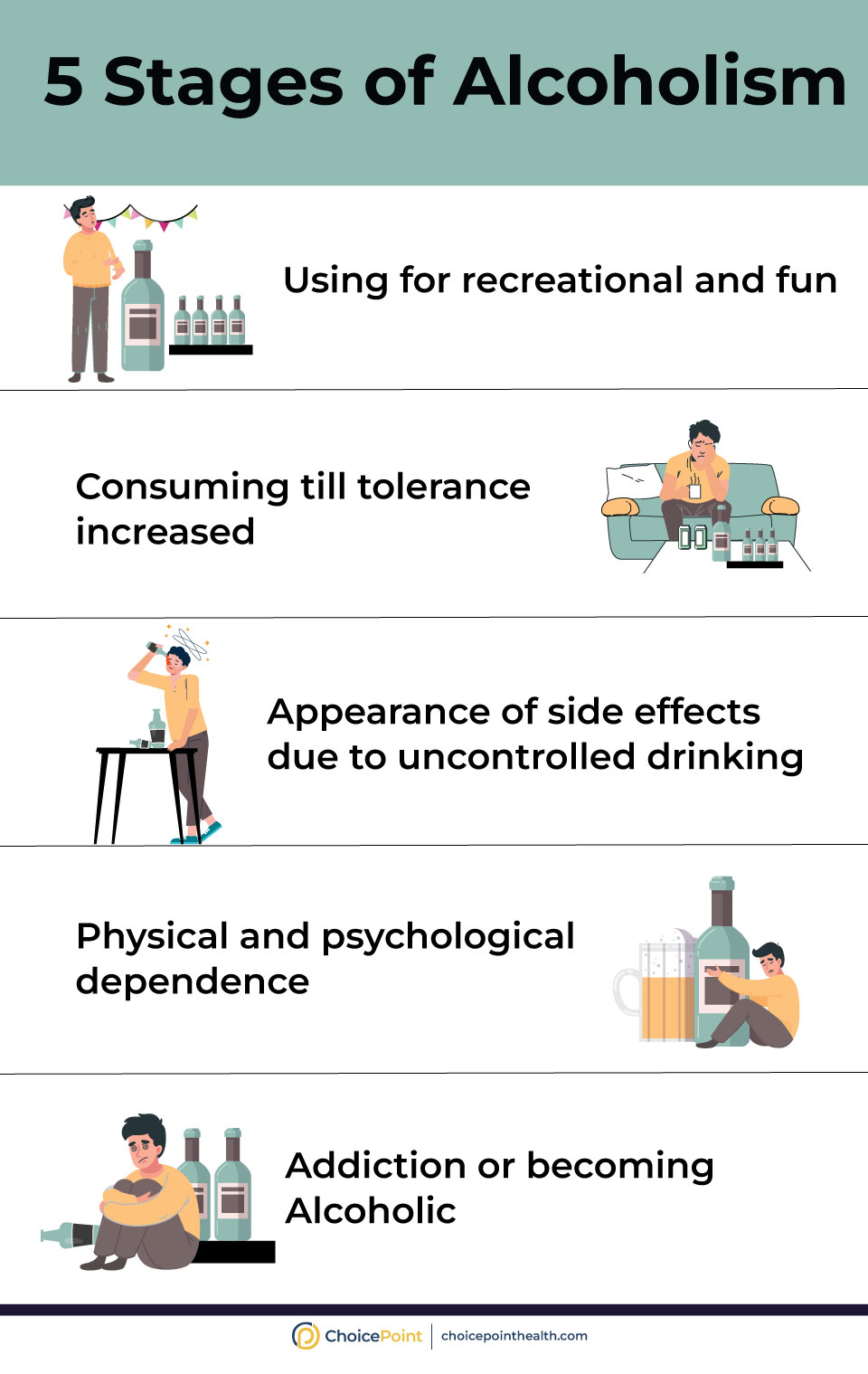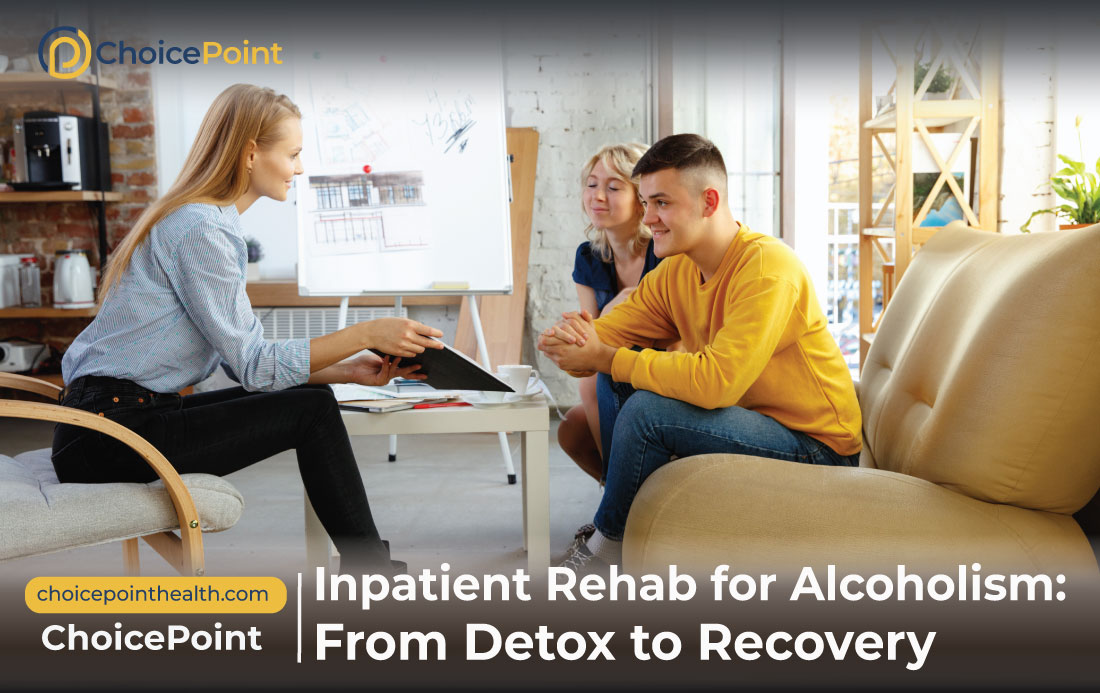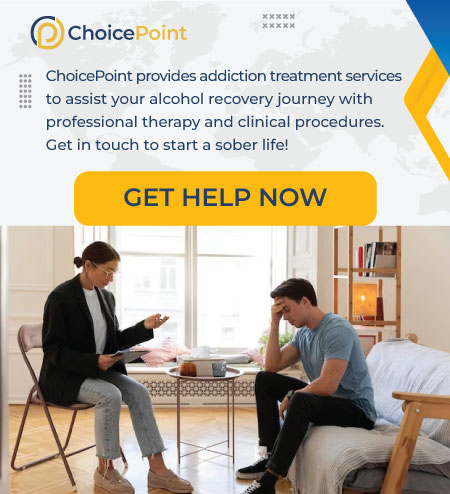Are you a Binge drinker? But did you know the stats depict that 1.4 million people in the U.S. have suffered from alcohol addiction in the past year? Excessive drinking could lead to abuse, which could turn you into an alcoholic. It is a painful and mentally destructive life unless you find the right way to achieve sobriety. This 5-minute free assessment can help you evaluate the severity of your addiction. Suppose you or your loved one is suffering from alcohol use disorder. In that case, inpatient rehab for alcoholism sounds much more promising in terms of getting comprehensive recovery than other forms of treatment. Let’s read how!
If you or your loved one is looking for expert guidance. Don’t wander off; contact ChoicePoint and get help from DEA-certified practitioners.
Table of Contents
Alcoholism: A Hindrance to Your Sobriety
Commonly referred to as alcohol use disorder, alcoholism makes a body dependent on alcohol. It becomes progressive with time and makes it difficult for an individual to quit without professional help due to complicated withdrawal symptoms.
Drinking Alcohol itself is not just the cause of alcohol addiction. There is a variety of factors associated with it that generally include:
- Psychological
- Genetic
- Social
To recover from alcohol addiction, an individual needs to have consistency and dedication in treatment that can be maintained with an inpatient rehab for alcoholism, which is structured in a stepwise way to assist the recovery journey.
Long-Term Effects of Alcoholism
Long-term alcoholism can have various side effects, such as:
- Leads to infertility in men and women.
- Mothers often give birth to impaired children due to excessive alcohol use.
- Alcohol addiction can lead to damaged liver and kidney and can cause wet brain syndrome.
- It also weakens immune and circulatory systems.
In this case, specialized alcohol treatment for the mother is necessary to keep the baby and mother safe from the aftereffects of alcoholism.
The Course of Treatment at an Inpatient Rehab for Alcoholism
According to facts, over 1 in 10 children live in a home where one of their parents is struggling with alcohol addiction, which seriously hampers their positive growth. An Inpatient rehab for alcoholism aims to remove this hurdle in the way of sobriety.
Before starting with inpatient alcoholism treatment, you might wonder how long inpatient rehab for alcohol. An inpatient rehab will evaluate a person for their:
- Severity of alcoholism
- History of alcohol use
- Mental issues such as anxiety or depression
- Type of treatment plan
Then, they will be placed for any of these durations:
- 30-day basic
- 60-day
- 90-day average
- Long-term 120 or more days
It can always increase/decrease depending on an individual’s situation, so let’s begin with how it works!
a. Detox to Manage Alcohol Withdrawal
Inpatient Rehab for Alcoholism may start with the most critical step of recovery: detoxification. It involves medically and psychologically managing a patient’s body while flushing alcohol toxicity.
The first step is to quit alcohol and get admitted to the rehab, where DEA-certified staff will monitor for potential changes happening in alcohol withdrawal. An individual may experience symptoms that they will treat, such as:
- Delerium tremens, such as restlessness with confusion, hallucination, and fever
- Vomiting and nausea
- Tremors
- Unstable blood and breathing rates
Alcohol detox requires a careful approach to withdrawal as some medications may interfere with alcohol, causing unpleasant side effects such as:
- Taking Diflucan with alcohol causes liver toxicity and digestive system problems.
- Taking suboxone with alcohol causes respiratory depression and liver damage.
If you are taking any other medication along with alcohol, you must quit immediately and seek professional help! Get in Touch 844.445.2563 to discuss how we can help.
Vivitrol MAT for Alcoholism
During treatment, a patient receives a medication-assisted treatment program under physicians who are specifically experts in dealing with patients during detox. Common FDA-approved medications are prescribed at this stage, such as:
You might be wondering, “Isn’t taking medications just trading one addiction for another?”
However, this isn’t the case here; these medications are FDA-approved, and only certified practitioners are allowed to dispense them with serious consideration. Because every medication, if not properly dispensed may come with serious side effects such as:
- A mismanaged dose of naltrexone (Vivitrol) may cause hallucinations, liver damage, and unpleasant neurological reactions.
Therefore, inpatient rehab for alcohol with DEA-certified experts experienced in alcohol detox is the best place to get them prescribed and administered without experiencing such side effects.
To get a safe and effective withdrawal for your alcoholism under expert practitioners at inpatient rehab, Call Now 844.445.2563.

What Are the 5 Stages of Alcoholism?
b. Behavioral Therapy for Comorbidity of Addiction and Mental Health Disorders
Psychological factors such as anxiety, schizophrenia, PTSD, and depression often become the major causes of alcohol addiction. These comorbid conditions persist side by side. Statistics show every 1 out of 9 adults get arrested in the U.S. for having co-occurring disorders, i.e., mental as well as alcohol use disorder.
An inpatient rehab for alcoholism makes a dual diagnosis an integral part of its treatment program to treat a person holistically for comorbid conditions with two major therapies, including.
Psychiatrists will use these therapies to change negative and hopeless behavior into a positive character-building mindset. Moreover, the following alcohol-affected symptoms can be covered by new coping behavior:
- Cognitive difficulties
- Dishonest behavior
- Restrained relationship
- Anxiety and depression
- Societal withdrawal
c. Psychotherapies: The Heart of Inpatient Rehab for Alcoholism
To achieve sobriety in the long term and avoid relapses, psychotherapies play an important role in managing mental withdrawal symptoms associated with alcohol. This involves CBT and DBT with specialized therapies such as
Individual Assessment Through Individual Therapy
This involves getting to know a person’s personality with individual therapy and knowing their flaws to improvise treatment accordingly. A one-on-one session is a prerequisite before going into other therapies and treatments to dispense personalized care.
Mental Support Group
Alcohol addiction is responsible for
- Social imbalance
- Restrained relationships with family and friends
- Impaired work-life due to societal withdrawal
Inpatient rehab for alcoholism has the benefit of providing two crucial therapies:
Psychologists apply these to improve your
- Social anxiety
- Secluded personality disorder
- Restrained relationships
Moreover, during family therapy, if your loved one is under alcohol influence, psychologists will give you tips for dating a recovering alcoholic so that the guilt and reclusiveness of alcoholism can be managed before letting them into the outside world with you.
d. Follow-up Care to Maintain Recovery
Once you get back to your normal life, circumstances will often make you fall back to relapse. That is where a patient needs follow-up care for at least a year and an aftercare plan at the inpatient rehab that includes:
- Nutritional plan
- Coping skill management
- Regular counseling sessions
- Addressing potential risk factors and triggers
- Self-care and self-confidence buildup
For follow-up care, A person doesn’t need to be in inpatient rehab for a year. Instead, they can opt for a telehealth treatment program that will supervise and give regular counseling sessions to address their concerns to prevent any signs of relapse beforehand!
For a comprehensive experience of recovery with all the essential elements of alcohol rehab. Contact ChoicePoint 844.445.2563.
Determining the Success of Your Inpatient Rehab for Alcohol Addiction
Research states that there are 40-60% chances for a relapse even after recovery. To keep track of inpatient rehab success and assist in follow-up care, inpatient experts may virtually consult with you by
- Monitoring relapse rate
- History of relapse
- Changes in behavior
It is quite normal for a person to experience relapse, but shame and guilt associated with it might make it worse. So, countless therapy sessions and comprehensive monitoring from your inpatient rehab experts through virtual sessions are good options for preserving recovery’s success.
Take the Right Step With ChoicePoint’s Inpatient Rehab for Alcoholism
You do not want to be a victim of alcohol ravages forever. At ChoicePoint’s inpatient rehab for alcohol, our DEA-certified practitioners provide exceptional care with 24/7 support and surveillance. Contact us to learn how we can help you get personalized care for your addiction-struggling life. We offer countless payment options and treatment programs to help you live a sober and addiction-free life:
- Commercial insurance programs
- Medicare and Medicaid
So, fill out this form to verify insurance and contact us today 844.445.2563 for a remarkable sober living experience!
Frequently Asked Questions About Alcohol Detox Process
The most concerning queries answered;
How Do I know If I have Alcoholism?
People tend to ignore the stages of addiction. There are a few observations to make to check yourself for alcohol addiction.
- You are unable to control yourself while drinking
- You have lost your tolerance
- Take this free assessment to check where you fall
- Experiencing reduced social appearance
How Long Does it Take to Get Detox From Alcohol?
It varies from person to person, but one may assume that alcohol detox can averagely last for up to 10 days.
Can We Mix Suboxone with Alcohol?
NO! Suboxone is used purely for opioid addiction treatment, and taking it while drinking alcohol can have its potential dangers!
Medical Disclaimer:
ChoicePoint aims to improve the quality of life for people struggling with substance use disorder and mental health issues. Our team of licensed medical professionals research, edit and review the content before publishing. However, this information is not intended to be a substitute for professional medical advice, diagnosis, or treatment. For medical advice please consult your physicians or ChoicePoint's qualified staff.

Start Your Recovery Journey Today!










Review Inpatient Rehab for Alcoholism: From Detox to Recovery.